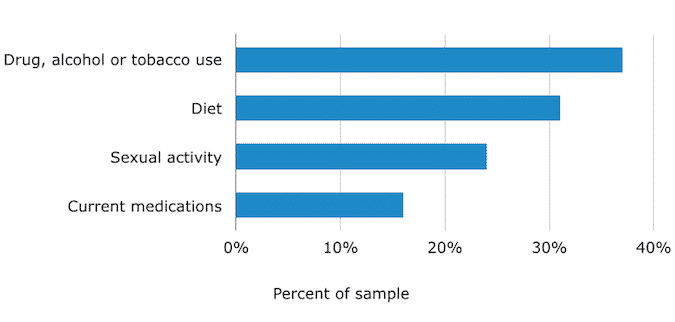
EHR research group Software Advice recently conducted a survey of 3,075 American patients that uncovered what motivates them to deliberately misinform their physician caregivers. Half of the patients surveyed admitted to withholding information, primarily for fear of judgment or in the avoidance of being lectured.
Percentage of Patients Who Lie
Patients indicated a number of reasons for withholding information or being dishonest including privacy concerns, and avoidance of treatment for financial or other reasons. But the most commonly reported motivation was embarrassment and/or wanting to avoid being “lectured.” This presents a real challenge for physicians, since while you obviously don’t want to come across as lecturing, part of your job is to help people understand the health consequences of their actions. And while the study does indicate certain behaviors that can be helpful in promoting honesty from patients, it may seem like there is only so much you as a physician can do to prevent someone from feeling embarrassed.
Methods of Deception
Type of Information Withheld/Not Honest About
This is a tough situation for physicians. It may seem that if you are honest and open with your patients about the consequences of lifestyle choices they are driven to not be honest with you, perceiving your medical opinion as lecturing. But on the other hand, if you don’t talk to them about those consequences are you really doing your duty to inform and try to promote your patients’ health? It does seem like a rock and a hard place kind of situation.
Even more frustrating, over 40% of the patients who said that they were sometimes dishonest with their doctors said that “there was nothing a doctor could do to get them to open up.” Talk about discouraging. But still, that means that nearly 60% of those who are currently not telling their doctors the whole truth believe that they could be persuaded. But how?
Well, according to the survey’s author, “Our findings indicate that physicians can treat these patients most effectively by reassuring them of confidentiality and lack of judgment thereby fostering a more open and supportive exchange. In taking the time to develop better communication strategies, physicians will see marked improvements in quality of care, patient satisfaction, and adherence, which then lead to decreased medical malpractice suits and increased practice profitability.” And this isn’t just guesswork or speculation. 35% of those who said that they had not always been honest but could be persuaded to be said that a reassurance of confidentiality would make them less likely to be dishonest. Of course, most patients know that there exists some kind of doctor patient confidentiality agreement, but being specific and simply reminding them can be powerful tools for putting their minds at ease. Likewise, another 23% said that a simple assurance of non-judgment could make the difference.
These kinds of reassurance techniques are easy things that are mostly just a developing into habits. Knowing the numbers and knowing that a substantial number of people may only be a reassurance or a reminder-of-confidentiality away from giving you a vital piece of information that could affect your diagnosis, their health, and your risk for a malpractice claim makes this information well worth paying attention to.
Finally, while there are those who seem set in their ways when it comes to withholding information or being dishonest here are a few things to remember. First, you don’t always have to rely on what people say. Physicians are smart people, trained in the art of discovery, solving puzzles, tracing out mysteries. Non-verbal cues often help with even the most non-communicative or even dishonest patients. Just ask Dr. House. Second, patients can change. A patient may not plan to lie to his doctor, but that same patient, when he took this survey may have recognized that he did often minimize some unhealthy behavior and that he was unlikely to stop doing so, maybe because it embarrasses him. Well, that may be true, but perhaps the right combination of steady eye contact, assurance that he won’t be judged, and maybe an anecdote or two from a doctor with a good bedside manner could bring him around—and if not this time, eventually, as a relationship of trust and openness is established. Third, and finally, 60% is a big number. Remember, 50% of patients said they are dishonest at least sometimes with their doctors, and of that 50% nearly 60% of them indicated that there were things their doctors could do to make them more likely to be honest. That’s a lot of people. If you could go from having 50% of your patients that never intentionally deceive you to over 75% wouldn’t that be something to be excited about? It sure would reduce your risk of misdiagnosis and malpractice litigation.
Be sure to read the rest of the study here, for lot’s more info and helpful analysis.







